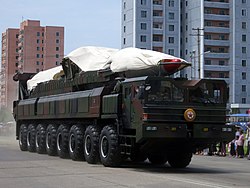
Back انتشار الأسلحة النووية Arabic পারমাণবিক অস্ত্রের বিস্তার Bengali/Bangla Nuklearna proliferacija BS Proliferació nuclear Catalan Amlhau niwclear Welsh Proliferation (Massenvernichtungswaffen) German Proliferación nuclear Spanish پروتکل الحاقی به معاهده منع گسترش سلاحهای هستهای Persian Ydinaseiden leviäminen Finnish Dissuasion et prolifération nucléaires au XXIe siècle French
- Atomic spy sketch of an implosion-type nuclear weapon, passed to the Soviet Union
- Project 596, China's first nuclear test, becoming the first nuclear power in Asia
- Hanford Site; chemical separation or reprocessing produces plutonium, a major proliferation risk
- Gas centrifuges, the prevailing method of uranium enrichment, another major proliferation risk
- Nuclear-capable ballistic missile on parade in North Korea, the most recent country to acquire nuclear weapons
- Meeting of the International Atomic Energy Agency, charged with proliferation control
| Nuclear weapons |
|---|
 |
| Background |
| Nuclear-armed states |
|
Nuclear proliferation is the spread of nuclear weapons to additional countries, particularly those not recognized as nuclear-weapon states by the Treaty on the Non-Proliferation of Nuclear Weapons, commonly known as the Non-Proliferation Treaty or NPT. Nuclear proliferation occurs through the spread of fissile material, and the technology and capabilities needed to produce it and to design and manufacture nuclear weapons. In a modern context, it also includes the spread of nuclear weapons to non-state actors. Proliferation has been opposed by many nations with and without nuclear weapons, as governments fear that more countries with nuclear weapons will increase the possibility of nuclear warfare (including the so-called countervalue targeting of civilians), de-stabilize international relations, or infringe upon the principle of state sovereignty. Conversely, supporters of deterrence theory argue that controlled proliferation decreases conflict rates via nuclear peace.
Nuclear weapons were initially researched during World War II, jointly by the United States, United Kingdom and Canada, and separately by Germany, Japan, the Soviet Union, and France. The United States was the first and is the only country to have used a nuclear weapon in war, when it used two bombs against Japan in August 1945. After surrendering, Germany and Japan ceased to be involved in any nuclear weapon research. A nuclear arms race followed, with further countries developing and testing nuclear weapons. The US primarily competed with the Soviet Union, which carried out their first test in 1949. Seven other countries developed nuclear weapons during the Cold War. The UK and France, both NATO members, developed fission and fusion weapons throughout the 1950s, and 1960s, respectively. China developed both against the backdrop of the Sino-Soviet split.
Five countries besides the five recognized Nuclear Weapon States have acquired, or are presumed to have acquired, nuclear weapons: Israel, South Africa, India, Pakistan, and North Korea. While South Africa dismantled its program and acceded, the other four states are not members of the NPT.[1] One critique of the NPT is that the treaty is discriminatory in the sense that only those countries that tested nuclear weapons before 1968 are recognized as nuclear weapon states while all other states are treated as non-nuclear-weapon states who can only join the treaty if they forswear nuclear weapons.[2]
Many other states pursued a nuclear weapons program without attaining weapons. These include Yugoslavia, South Korea, Libya, Brazil, Iraq, Iran, and Syria.[3] Some states, such as modern Iran and Japan, are suggested to maintain nuclear latency, the capacity to rapidly develop nuclear weapons on demand. Proliferation is tied to the development of civilian nuclear power, as fuel reprocessing and uranium enrichment facilities have dual use for producing both civilian and weapons-grade fissile material. It is also tied to the proliferation of nuclear weapons delivery systems, especially ballistic missiles.
- ^ "Strong sign of North Korean nuclear test as regime calls 6 May party congress". The Guardian. 27 April 2016. Archived from the original on 24 December 2019. Retrieved 4 October 2016.
- ^ Tannenwald, Nina (2013). "Justice and Fairness in the Nuclear Nonproliferation Regime" (PDF). Ethics and International Affairs. 27 (3): 299–315. doi:10.1017/S0892679413000221. S2CID 11753655. Archived from the original (PDF) on 12 June 2018. Retrieved 6 June 2018 – via Carnegie Council for Ethics in International Affairs.
- ^ Kim, Chul Min; Park, Hyeon Seok; Yim, Man-Sung (5 February 2025). "Nuclear latency, nuclear power, and nuclear proliferation". The Nonproliferation Review: 1–34. doi:10.1080/10736700.2024.2406590. ISSN 1073-6700.
© MMXXIII Rich X Search. We shall prevail. All rights reserved. Rich X Search





